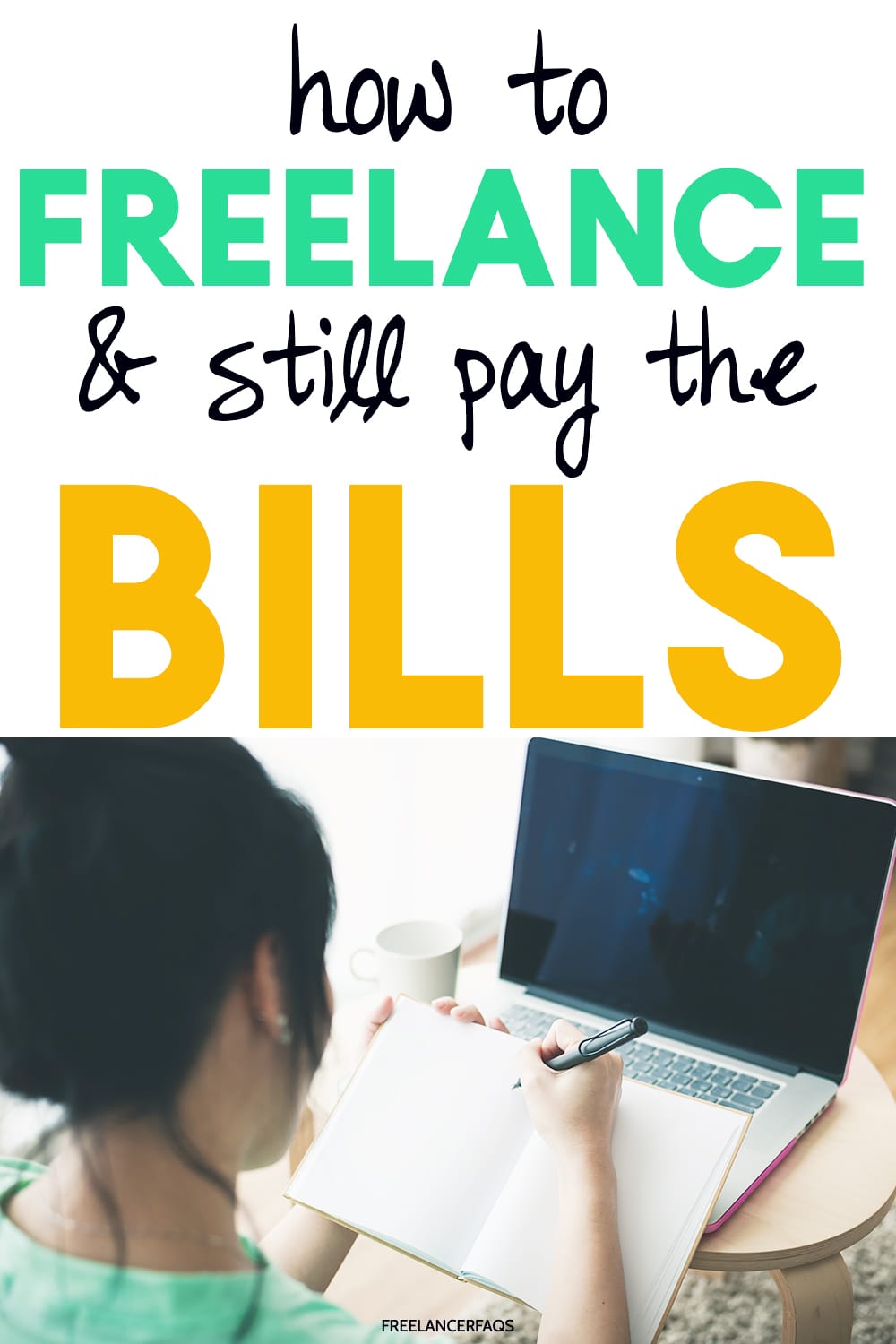Have you always dreamed of working from home? Escape the morning traffic or see your kids before they go to bed at night?
Freelance work from home jobs is an amazing – and doable – option nowadays.

Freelance work is an amazing – and doable – option nowadays.
Freelance work is an amazing – and doable – option nowadays.
As the world transitioned to work from home freelance jobs as a result of the Coronavirus crisis, maybe you’re wondering if you should take this chance to realize that dream yourself.
The idea is exciting for sure. You can be your own boss, and be in charge of your own schedule.
It’s also a little scary, because working full time as a freelancer is essentially starting your own business.
And what turns people away from owning a business is the risk and the uncertainty of not having a steady income with those freelance work from home jobs.
Especially, during a pandemic when millions of people are out of work.
But take heart, being an entrepreneur is all about overcoming challenges after all.
With planning, preparation, and a lot of determination, you will soon be running your own freelance business at home.
Here we go—a step by step guide on how you can successfully do freelance work from home jobs – and still pay your bills.
5 Steps to Freelance Work from Home Jobs as a Beginner

1. Create a Business Plan
For this, you can make an elaborate vision board, a simple Word document, or a few sentences on your journal.
You’ll appreciate having one once you start freelance work. You’d also want to update it often.
The idea is to give yourself a roadmap with set timelines on how to go about landing those freelance work from home jobs.
Here are some questions to guide you through.
Answer them with your SMART goals in mind.
Specific. Measurable. Achievable. Relevant. Time bound.
- Why do you want to be a full-time freelancer? Take your time with this question as the answer will guide your business. Is your goal to make more money? Or work less and have more time with your family?
- Who will be your clients? Research how you’ll get your first client. And where to find them.
- Do you have all the skills you need to succeed as a full-time freelancer? If not, how do you plan to develop and gain experience?
- How will you convince clients that you can deliver what you say you can? Maybe you need a portfolio. How will you create one and how much time will you give yourself to complete it?
- What will be a typical working day for you? Do a mock-up schedule of your day. Do you need to make changes to make time for your new venture?
2. Know Your Numbers
If you’re going to live off an inconsistent income while you build your freelance business, you should know how much you need for living expenses – especially if you have dependents or debts to pay off.
To start, figure out your basic living expenses, which may include:
- rent or mortgage
- food and other necessities
- utilities, internet, and phone bills
- insurance payments
- transportation costs
- debt payments
Track your expenses for at least 3 months, and see if there are areas where you can save money.
Take that savings and put it back in your emergency fund or pay down some debts.
This will also be a good time to create a budget, if you don’t use one already. If you need some help with budgeting, clever girl finance is offering this course free of charge.
3. Set Up Your Transition Fund
You probably won’t make full-time income right away as a freelancer. But if you’re still working and receiving a steady paycheck, you’re in the best position to prepare.
Set up your transition fund before you tender that resignation letter, and it will keep you afloat during the first months when you may not have recurring projects yet.
How to Set Up a Transition Fund
Revisit your budget and create one that reflects your expenses if you are to work as a freelancer.
Your mortgage, insurance, and utilities might be the same but maybe transportation and daycare expenses can be adjusted?
It’s also important that you factor in certain benefits such as medical and dental that you may lose when you quit your job. These expenses will have to be added to your budget.
Now that you know how much you need to cover your bills and household expenses every month. Set a specific and realistic goal based on that number.
 You can start by setting a goal to save one month’s worth of living expenses. And build from there.
You can start by setting a goal to save one month’s worth of living expenses. And build from there.
Having a specific target amount is clearer than just telling yourself you want to build a transition fund without knowing how much you need to save.
2 Ways to Save for Your Transition Fund
- One way to save for your transition fund is to take on freelance work from home jobs while you’re still working your regular job. And deposit all that earnings to a separate account. Savings accounts don’t cost any fees. So, you can open as many as you need for your financial goals.
- You can also allocate 10 percent of every paycheck into your transition fund. It may take some time. But consistency pays off. And as long as you’re diligent about saving, you’ll reach your goal sooner than you think.
4. Get Recurring Gigs
The popular advice that you shouldn’t leave your current job before you have one lined up, applies when you’re quitting to be your own boss as well.
A freelancer’s steady paycheck comes from recurring gigs. So, it is best to have a few clients who needs your services for weekly or monthly projects before you quit your job.
And the day after you said ciao to your boss, update that business plan. You must have at least 3 month’s worth of work planned.
Just as you prepared to cover your finances when you set up a transition fund. You also need to plan how you’ll spend your days when you have all that time freed up.
If you quit without a few recurring projects and without a plan, you may find yourself wasting the time away staring at job boards, or at a loss on what to do next.
And that will not move your business forward or earn you any income.
5. Create Other Streams of Income
At the start and throughout your freelance work from home jobs, you’ll have to learn every aspect of owning a business. From marketing yourself to accounting and beyond.
To grow personally and professionally, you’ll also have to be open for and keep looking for other streams of income.
How do you add new streams of income to your freelance business?
Learn a New Skill to be Able to Offer New Services
As a freelancer, you should be constantly challenging yourself to learn new skills. It is a great way to keep up with the job market. And to make your services more marketable and valuable to clients.
Some new freelance services you can add to your portfolio include:
- White paper writing
- Pin graphic design
- Online editing
- Facebook Ad copy
- Email marketing writing
Invest in Yourself
There are a lot of paid and free courses for every industry and every freelancer out there. But just because it’s free doesn’t mean it’s worth your time.
And just because it’s expensive doesn’t mean it’s going to give you the result you want either.
How to choose courses or mentorship programs?
- Is it being offered by a company or a freelancer who had success within that particular industry?
- Network and ask fellow freelancers for courses that have advanced their skills and careers.
- Read the reviews. And look beyond affiliate reviewers.
Elna Cain is a successful freelance writer and has a free email course to help you find your first client!
Look for Ways to Leverage Your Skills and Knowledge
As you grow your business, you also gain experience and expertise in your industry. You can share that knowledge through:
- Course creation either for yourself or for clients
- One-on-one coaching
- Speaking engagements
- Starting a podcast
Getting Started With Freelance Work From Home Jobs
There you have it!
A step by step guideline on how to work from home successfully as a freelancer without the worries of being able to afford your bills.
Preparation is key.
Add some confidence, motivation, and determination, and you are ready to take on the freelance world.
Over to you – what tips or advice would you add to my list to help you get on the right foot as a freelancer?



Leave a Reply